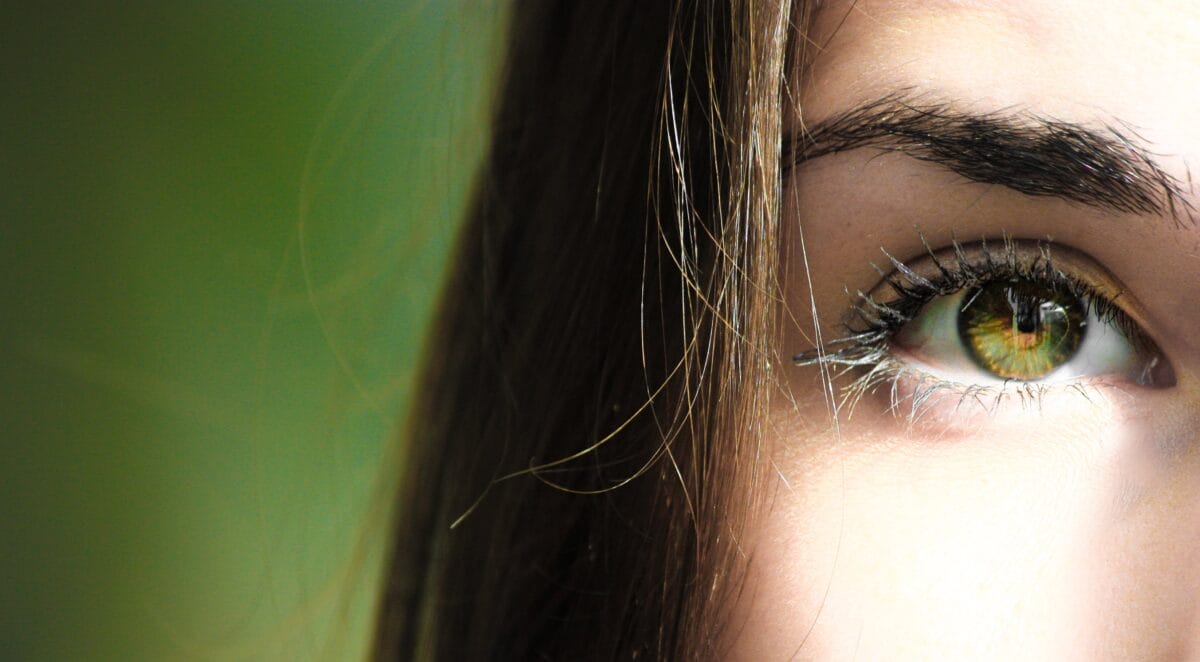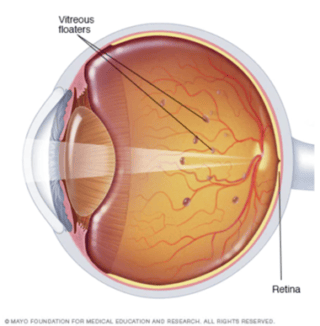EYE FLOATERS

Eye floaters are spots in your vision. They may look to you like black or gray specks, strings, or cobwebs. They may drift about when you move your eyes. Floaters appear to dart away when you try to look at them directly.
Most floaters are caused by age-related changes that occur as the jelly-like substance (vitreous humor) inside your eye, liquifies and contracts. Scattered clumps of collagen fibers form within the vitreous and can cast tiny shadows on your retina. The shadows you see are called floaters.

The vitreous humor begins to shrink with age, which is also called vitreous degeneration. As the gel-like substance thins, it leads to small substances in the visual field, such as spots or rings. In some cases, vitreous humor gets detached from the retina, also known as posterior vitreous detachment (PVD), which can lead to serious issues such as retinal detachment.
A retinal tear occurs when vitreous pulls away from the retina, tearing the lining at the back of the eye (retina). If this condition is not treated promptly, it will lead to retinal detachment, which requires urgent surgery.
Some symptoms that are indicative of a retinal detachment are; photopsia (flashes of light), reduced peripheral vision, and a sudden occurrence of floaters. Left untreated, a retinal detachment will lead to irreversible vision loss.
NOTE- If you notice a sudden increase in the number or size of floaters— especially if you also see flashes of light or what appear to be cobwebs or a curtain effect over a portion of your vision, seek immediate help. These can be signs of an emergency that requires prompt attention. Contact your eyecare specialist or go to the ER immediately. DO NOT go to an urgent care facility. They are not equipped to deal with these issues.
Causes of Floaters
Floaters can be due to changes in the vitreous fluid, which is associated with age, and many other conditions and diseases. Here are a few.
- Age- The most common cause of eye floaters is changes in the vitreous humor due to ageing. Over time, the vitreous fluid gets shrunk, which leads to the clumping of collagen fibers that are a part of the gel. This blocks the light that passes through the eye, causing shadows, which you see as tiny floaters.
- Inflammation in the eye- Uvea or Uveitis happens when the middle tissue of the eye wall gets inflamed. The back layer of the eye, which connects the retina and choroid (An eye layer), gets affected by posterior uveitis, causing eye floaters. Some causes of posterior uveitis are auto-immune diseases and inflammatory diseases.
- Eye surgeries and medications- Many medications that are injected into the eye cause air bubbles that form shadows until the eyes absorb them. Also, silicon oil bubbles are added in certain surgeries on the vitreous and retina, causing eye floaters.
- Torn retina- A torn retina happens when the contraction of the vitreous tears the retina. If not treated, it leads to retinal detachment, in which fluid leaks behind the tear, separating the retina from the eye, which leads to permanent vision loss.
Treatment of Eye Floaters
Most floaters don’t require treatment. However, if a medical condition is the cause of the floaters, such diabetes or inflammation, it needs to be treated.
Floaters can be frustrating and adjusting to them can take time. Once you determine the floaters will not cause more problems, over time you may learn to ignore them or notice them less often.
If the floaters get in the way of your vision, which happens rarely, you and your eye care specialist may consider treatment. Options include surgery to remove the vitreous or a laser to disrupt the floaters.
- Vitrectomy. An ophthalmologist who specializes in retina and vitreous surgery removes the vitreous through a small incision. The vitreous is replaced with a solution to help your eye maintain its shape. The surgery may not remove all the floaters, and new floaters can develop. Risks of a vitrectomy include infection, bleeding and retinal tears.
- Vitreolysis. The ophthalmologist aims a special laser at the floaters in the vitreous. This breaks up the floaters and makes them less noticeable. Some people report improved vision while others notice little or no difference. Risks of laser therapy include damage to your retina by the laser is aimed incorrectly.
Complications of Floaters
Floaters can be a nuisance, but they usually don’t pose a serious threat to your overall health. However, in some cases they are a symptom of a more serious, underlying condition. If you experience sudden and significant changes in your floaters, flashes of light, or a curtain-like shadow in your vision, it’s time to pick up the phone and call your eye doctor.
When To See an Eye Doctor
Contact an eye specialist immediately if you notice:
- Many more eye floaters than usual
- A sudden onset of new floaters
- Flashes of light in the same eye as the floaters
- A gray curtain or blurry area that blocks part of your vision
- Darkness on a side or sides of your vision (peripheral vision loss)
These symptoms, although painless, could be caused by a retinal tear, detachment or other serious eye problem. Immediate medical treatment is necessary. So, don’t hesitate to reach out when things take a turn for the worse.
Can Floaters be Prevented?
Preventing the occurrence of vitreous floaters is challenging. They often result from natural changes within the eye. However, adopting healthy habits, such as protecting your eyes from injury, keeping regular eye appointments, and managing any systemic conditions that affect eye health may help minimize the risk or progression of vitreous floaters. It is important to remember that some floaters are a normal part of the aging process and may not be entirely preventable.
Conclusion, vitreous floaters can be a bothersome visual phenomenon, but they are typically harmless. Understanding their causes, recognizing the symptoms, and exploring the available treatment options can help individuals manage and cope with this condition. Whether through observation, surgical intervention, or lifestyle adjustments, it is possible to find relief and improve visual clarity. If you are experiencing persistent or severe symptoms, it is always advisable to seek an eye care specialist like Goodrich Optical to rule out any underlying complications. With the right knowledge and care, individuals can navigate the presence of vitreous floaters and maintain optimal eye health and well-being.

